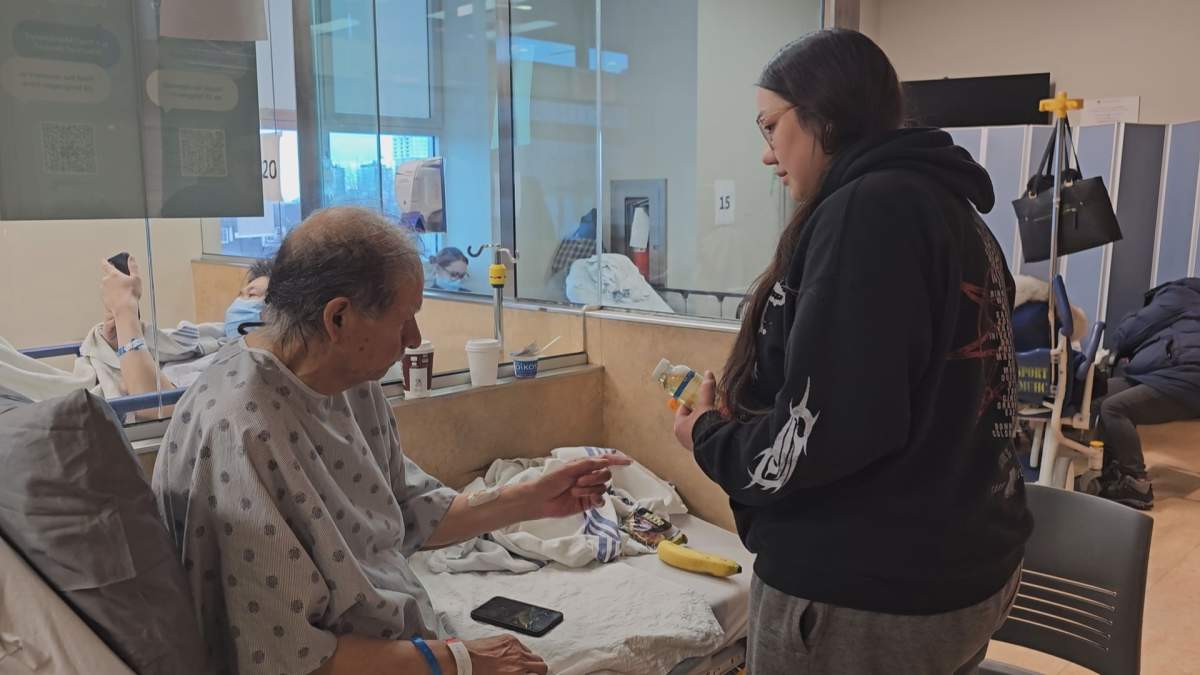After five months of pain, Cree elder Matthew Mukash left his small community in northern Quebec to receive medical care in Montreal, only to spend four days in an emergency department waiting for a room.

Jade Mukash is sharing her grandfather’s story in hope of bringing change after they travelled more than 1,000 kilometres from Whapmagoostui off the coast of Hudson Bay. His experience comes as the province’s emergency rooms have been overwhelmed in recent weeks.
“It was quite a heartbreaking experience,” Jade Mukash said in an interview Wednesday. “Very intense.”
The former grand chief of the Council of the Crees first felt unwell last August and was dealing with health issues that were concerning for his family, according to his granddaughter. Mukash was experiencing weight loss and mobility problems.
In early January, she brought Mukash to a local clinic to see a physician and they were referred to the Montreal General Hospital for further care. They landed in Montreal two days later, on Jan. 7, and immediately brought to the hospital’s ER.
After he was triaged, Jade Mukash said her 72-year-old grandfather underwent different tests and was kept in the examination room overnight. They were informed the next morning he was going to be admitted to the hospital due to his test results.
That is when they spent four days in the ER’s lobby while waiting for a room to free up. Mukash was stuck in a bed in a hallway next to the busy admissions’ office, where his family says there was “constant movement and talking.”
“There was no rest for my grandfather,” Jade Mukash said.
They made a request to be moved to a quieter spot while waiting in the ER. Jade Mukash says they were told by health-care staff they were “just waiting” for an available room to admit her grandfather.
“And it never happened,” she said.

Get weekly health news
The Cree elder left four days after he first stepped into the hospital, without ever leaving the ER.
“He was only discharged because they didn’t have a room and they didn’t know when a room would be made available.”
Jade Mukash says her grandfather did receive medical attention from nurses, but the environment he was left in while waiting for additional care was “the most stressful part of the whole situation.”
“For Indigenous people, especially those who come from up north, we can’t just say ‘We’re going to go home’ or choose a different hospital,” she said. “We have to follow protocols under Cree patient services, who takes care of us in the city when we go to our appointments. So, there is really no choice for Indigenous patients to just leave without thinking. I have to get a flight home on my own if I don’t follow the protocols.”
After being discharged, Jade Mukash says they were sent to a hotel for Cree patients before they were supposed to fly home the following morning. But her grandfather was tired from the whole ordeal, so they opted to stay in Montreal for a few more days and cover the expenses for a later flight back home.
Long waits to get to overcrowded ERs in Montreal
Quebec’s emergency rooms are overcrowded, with the situation expected to last through winter. The province’s health minister has made repeated calls to avoid them when possible, urging patients to consider other options such as calling the 811 health line.
According to the Index Santé website, emergency departments across Quebec were averaging 133 per cent capacity on Wednesday.
But Jade Mukash says Indigenous patients face even longer wait times and delays since access to immediate urgent care is limited in northern Quebec. Even before this, it has taken months for other members of her family to get to Montreal to receive medical care.
“Five months into the pain, then he was sent to Montreal to really get the proper diagnosis. And this is a story that you see often in the Cree Nation. It’s not easy to get a referral,” she said. “You have to really push to get that referral to really get that care.”

Jade Mukash said she is sharing her grandfather’s story in the hope it will help prevent such a situation from happening to other patients. While she understands the current situation in Quebec’s ERs, she stresses there needs to be more compassion for Indigenous patients who travel great lengths for care.
“It’s very unfortunate and it was heartbreaking to see my grandfather go through that,” she said. “But sometimes when it happens to someone of that status, we’re able to use his voice to speak for people, and that’s what’s important for us.”
The McGill University Health Centre (MUHC), which oversees the Montreal General Hospital, said it could not comment on Mukash’s situation due to patient confidentiality. The MUHC did say, however, it has a liaison officer to provide support and answer questions to Indigenous patients from northern Quebec and their families.
In a statement, the MUHC also said all health-care establishments are going through “difficult times” and it is “no exception.” The MUHC’s emergency departments are overcrowded for several reasons, including a staff shortages and “a record number of patients occupying our beds while waiting to be transferred elsewhere in the network.”
“This unfortunate situation has an impact on our patients and their families,” the hospital network said.
The office of Quebec Indigenous Affairs Minister Ian Lafrenière said in a statement he is “very concerned” about Mukash’s experience, though it also noted it did not have all the details to judge the situation.
But Lafrenière’s office also said health-care institutions “must ensure that they adapt their services so that they are culturally safe for First Nations peoples. The presence of a loved one, for example, is part of such an approach.”
— with files from The Canadian Press









Comments
Want to discuss? Please read our Commenting Policy first.